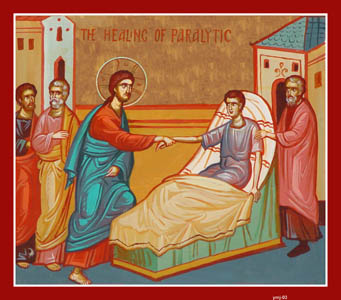Pay attention to three phrases.
25 Απριλίου 2010
Metropolitan Antony of Sourozh
I should like you to pay attention to three phrases of today’s Gospel.
The first one is a tragic word of a man who for 38 years had been ill, without receiving any help from those from whom he hoped healing. 38 years he found not one person to help him to receive wholeness and healing. This is an image and a reality. It was reality because it happened to that one man, but isn’t it an image that should reach all of us? How many people nowadays are in desperate need of wholeness, of physical health, of support, of spiritual healing – and there is not one person who is prepared to give it: not unable to, but not prepared to, because no-one realy looks in order to see another man’s needs.
And here is a second thing I want to attract your attention to – not one person, not one of those who himself needed healing was ready to postpone the hope, the chance of being the first to merge himself into those healing waters of the Pool of Bethesda. No-one chose to remain sick, in need, ill, bereft of wholeness for the sake of compassion, thinking ‘Here is one who needs it more than I do: 38 years as he tried and hoped – I can wait’.
Isn’t that something that happens time and again to each of us? We push forward, we are in a hurry, we want to receive, and we elbow out of the way other people who might be in greater need that we are – or whether they are not in greater need, who might well call out a movement of compassion in our heart. But our heart remains of stone, we want what we believe we need: others can forgo it, or others may wait.
And then, there is a third feature. Christ meets this man who did not know who He is, and He says to him: ‘Beware! Sin no more – because otherwise worth may come upon thee’. This is something which is addressed no longer to the one who is broken by illness, who has no wholeness within himself, neither is it addressed to the one who might have sacrificed himself for the sake of another: it is addressed to each of us also. Sin is primarily lack of wholeness resulting from our separatedness from God. In God we cannot be broken, in God there is wholeness; and ‘sin no more’ means that if God has been so merciful as to give him back the wholeness of body, of soul, of mind, of will that you have lost, – cling to the One Who has made you whole – to the living God.
This applies to each of us, because each of us lacks wholeness. We are all physically ill, but we are all broken in more than one way: who can claim that there is in him that serene and glorious wholeness which we find in the Lord Jesus Christ: the perfect, whole man, in the Mother of God, in some or all the saints.
Let us reflect on those three aspects: whom, or how many people have we left out, whom we could have helped to wholeness? Have we ever in our life chosen to forego what we longed for someone else to receive it, because he needed it? And lastly, why are we so far from God, that brokenness is our continuous condition? Amen.




